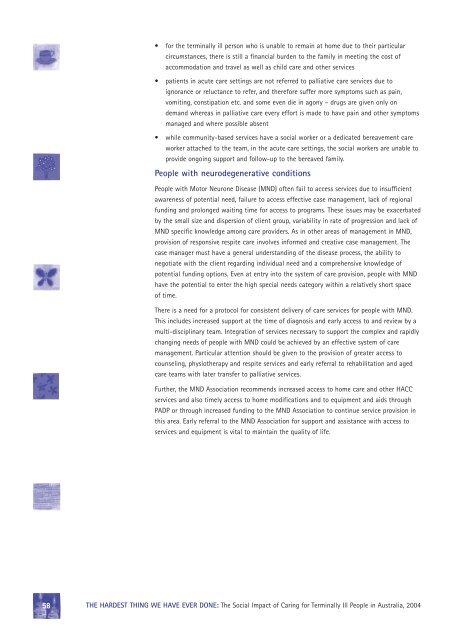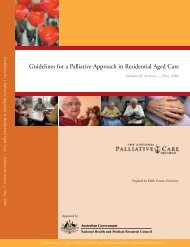The hardest thing we have ever done - Palliative Care Australia
The hardest thing we have ever done - Palliative Care Australia
The hardest thing we have ever done - Palliative Care Australia
You also want an ePaper? Increase the reach of your titles
YUMPU automatically turns print PDFs into web optimized ePapers that Google loves.
• for the terminally ill person who is unable to remain at home due to their particular<br />
circumstances, there is still a financial burden to the family in meeting the cost of<br />
accommodation and travel as <strong>we</strong>ll as child care and other services<br />
• patients in acute care settings are not referred to palliative care services due to<br />
ignorance or reluctance to refer, and therefore suffer more symptoms such as pain,<br />
vomiting, constipation etc. and some even die in agony – drugs are given only on<br />
demand whereas in palliative care <strong>ever</strong>y effort is made to <strong>have</strong> pain and other symptoms<br />
managed and where possible absent<br />
• while community-based services <strong>have</strong> a social worker or a dedicated bereavement care<br />
worker attached to the team, in the acute care settings, the social workers are unable to<br />
provide ongoing support and follow-up to the bereaved family.<br />
People with neurodegenerative conditions<br />
People with Motor Neurone Disease (MND) often fail to access services due to insufficient<br />
awareness of potential need, failure to access effective case management, lack of regional<br />
funding and prolonged waiting time for access to programs. <strong>The</strong>se issues may be exacerbated<br />
by the small size and dispersion of client group, variability in rate of progression and lack of<br />
MND specific knowledge among care providers. As in other areas of management in MND,<br />
provision of responsive respite care involves informed and creative case management. <strong>The</strong><br />
case manager must <strong>have</strong> a general understanding of the disease process, the ability to<br />
negotiate with the client regarding individual need and a comprehensive knowledge of<br />
potential funding options. Even at entry into the system of care provision, people with MND<br />
<strong>have</strong> the potential to enter the high special needs category within a relatively short space<br />
of time.<br />
<strong>The</strong>re is a need for a protocol for consistent delivery of care services for people with MND.<br />
This includes increased support at the time of diagnosis and early access to and review by a<br />
multi-disciplinary team. Integration of services necessary to support the complex and rapidly<br />
changing needs of people with MND could be achieved by an effective system of care<br />
management. Particular attention should be given to the provision of greater access to<br />
counseling, physiotherapy and respite services and early referral to rehabilitation and aged<br />
care teams with later transfer to palliative services.<br />
Further, the MND Association recommends increased access to home care and other HACC<br />
services and also timely access to home modifications and to equipment and aids through<br />
PADP or through increased funding to the MND Association to continue service provision in<br />
this area. Early referral to the MND Association for support and assistance with access to<br />
services and equipment is vital to maintain the quality of life.<br />
58 THE HARDEST THING WE HAVE EVER DONE: <strong>The</strong> Social Impact of Caring for Terminally Ill People in <strong>Australia</strong>, 2004
















